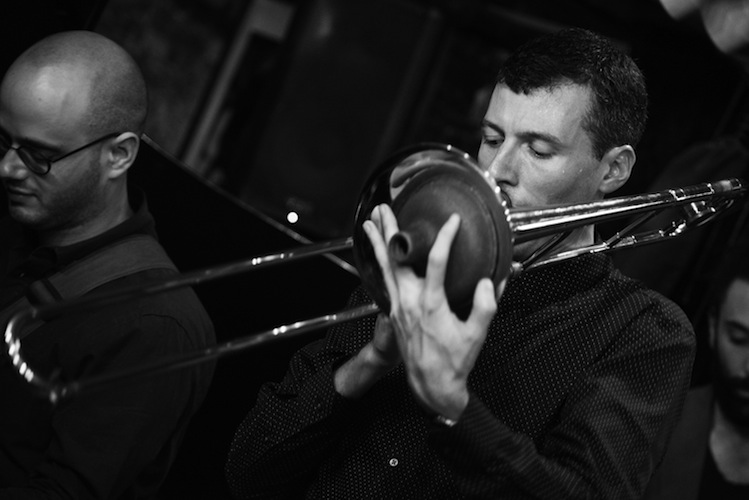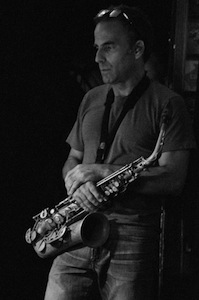By Filipe Freitas
Nick Finzer at Smalls, 2017 ©Clara Pereira
Name: Nick Finzer
Instrument: trombone
Style: postbop, contemporary jazz
Album Highlights: The Chase (Origin Records, 2015); Hear & Now (Outside in Music, 2017).
Three years separate The Chase from Hear & Now, which feature exactly the same sextet. How often do you guys play together?
We play together a lot, and not just in my group. Most of these guys are part of the tenor player nonet and we play at Smalls once a month. It’s been a crazy couple of years and I think now, more than before, we appreciate the opportunity we have to play together.
What has changed in the process of making those two records?
Recording The Chase was kind of a last minute throwing together. Like, here are the tunes, even if we haven’t played in a while.
This record was further better planned and I had a better concept about the music. I think it was a little bit more relaxed and I had more time to mature it. Everyone is pretty young and we’re still figuring out how to live (laughs).
There are some words in the CD booklet that in a certain way try to describe your motivations for this record. I see words like passion, inspiration, and vision, but I also see evolution, action, and change. What do you really mean with these last three?
To me, it’s just about people trying to grow within themselves and kind of being open, having discussions, and allowing for an evolution of thought. It’s also about me trying to allow myself to keep developing and try to actually express opinions rather than just talk around. Voice our opinions and share what we think when people are doing something that’s not beneficial. The record kind of documents the emotional turbulences of 2016, which was when our music was written and recorded. It has to do with the rise and fall of the whole year; all the political, social and environmental stuff is all over in there.
I personally feel some sort of spiritual side on “We, The People”. Are you a spiritual man?
I don’t know if I’m that spiritual of a person… I’m certainly not religious in any particular way. But for me that composition was trying to embody the energy of people coming together, talking and fighting for what they believe in. It's that power, when people come together, more than any particular spiritual thing. I definitely was going for that high energy.
Your music blends tradition and contemporary jazz. How is this done within your compositional process?
I’m a product of my generation, I think. I came up through jazz education, and the way we learn is through tradition. The first jazz music I heard was Duke Ellington’s music and that always stuck with me. Some of my favorite trombone players come from the 50s and 60s, but we live now, and I love so many composers that wrote stuff between 1970 and now. I think it becomes a natural outcome of having all those influences.
For my compositional process, I always wanted to have those elements of jazz I feel are important: some kind of swing and blues elements thrown in there, but not all the time, and then combine them with the harmonies that are maybe a bit more contemporary, less traditionally bebop. When I write, I try to think about the relationship between the highest pitch and the lowest, the counterpoint between those. To me, the stuff in the middle is more flexible. If it’s strong on the outside you can kind of take some chances and create some interesting inner lines.
What comes first when you compose a tune, the melody or the harmony?
When I first started writing, the chord progression usually came first because I felt once I write the melody I couldn’t come up with “cool” chord changes. But as time went on, after two records and trying to write for a third one, I realize that the tunes that stuck the best were the ones that the melody drove the composition. So, I try to do that first.
“Dance of Persistence” is about not giving up. Do you ever thought or think of giving up?
Sure! I try not to, but sometimes it’s rough. Sometimes it feels like people don’t really care about what we’re doing. But then, there are people out there that do care; you just have to find them. The longer you stick with this crazy life in the jazz industry, the more you see its value, and the more you see how to make it work and stick it out.
What was the hardest time of your career?
I have to say I’ve been fairly fortunate that things have gone relatively smoothly for me, but the hardest times have been mostly when things are so crazily busy that I have no time to create anything. It basically happened from the summer of 2014 until the summer of 2016, when I was almost constantly on the road, which is a blessing, but just being super crazy and my personal life being kind of difficult because of being away. But, you know, I just take one day at the time, looking forward and persisting on, as we just talked about.
What do you have to say about that generalized idea that the trombone is neglected in comparison with saxophone or trumpet, for instance?
I think it’s true that we’re not as often used, but trombone players have always been so important. Tommy Dorsey and Glenn Miller, right in the beginning, were driving things forward; also great composers in Ellington’s bands; and we always have had strong presences within the musician community. Sometimes in terms of taking a leadership role, people think the instrument is circus-like or abrasive. But there’s a lot of guys right now who are trying to put the trombone back out there, and in front of a band. People put us to the side sometimes, but it’s our job to kind of show people we can do the same things as any other instrument. It’s just a different voice.
Steve Turre and Wycliffe Gordon were your mentors. Did they bring any influence into your music?
Yeah, I think they both live on my shoulder all the time. I get along very well with both of them and they were super supportive so far, coming to gigs, listening to the stuff, and letting me know when things are not ok.
I would say that Wycliffe has been essential in the way he’s the kind of guy who shows you something and then says: now it’s your turn to figure it out. It’s like a very different learning experience.
Steve Turre was very hands-on with us. He would say “this is how Dizzy Gillespie showed me how to play this” or “this is how McCoy Tyner showed me how to play this”, trying to connect us with the tradition through himself, who played with these people.
If not a musician, what would you have been?
I wanted to be a baseball player. When I was in the middle school playing for the baseball team, I had a long discussion with my dad, who told me: “you really aren’t very good at that”. Then, I wanted to be a chef for a while, but then I got bit by the music bug and went that way.
What do you picture in your mind when improvising?
I’m not really picturing something but rather listening and trying to contribute by being in the moment and in the music. Sometimes I can try to picture the musical notation when someone is playing.
Which color would you pick to associate with your music?
Maybe purple. With the band and the music, I always try to have a kind of rich color palette, a rich and deep feeling to it, instead of just playing at a surface level.
Can you name two persons who marked you the most as a musician?
Wynton Marsalis, because he was very honest and clear with me, changing my perception of myself for the better. It was what I needed at that moment. He doesn’t know that or even remember, but to me he was very important.
And probably Steve Turre, who was always super helpful to me… but there’s also a composer called Dave Rivello. He was kind of in the Bob Brookmeyer school, arranging and writing, and I played in his 12-piece band every week when I was an undergrad. He really opened my eyes and ears to what it takes to put your music together and get a gig. He was a great example.
And two musicians you would like to play with?
I‘ve always wanted to play with Chick Corea. There was a time I was obsessed with Now He Sings, Now He Sobs, and I still go back to it all the time.
The other one is also a pianist, Herbie Hancock. The first jazz gig I really played was music from Herbie, so I’ve always wanted to play with him.





